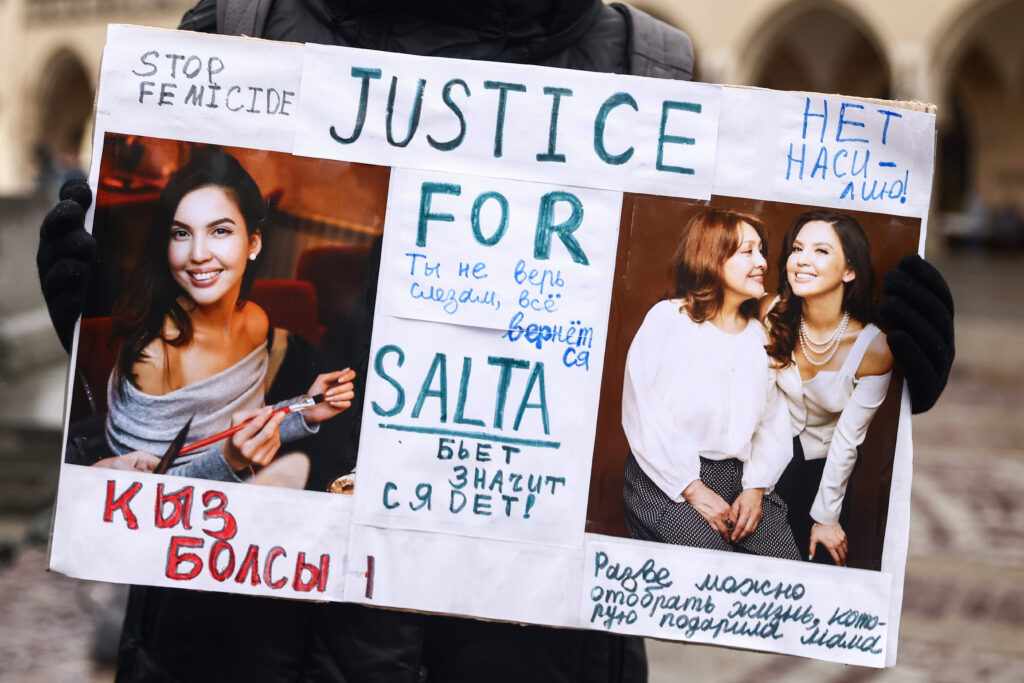The trial of former Kazakh Economy Minister Kuandyk Bishimbayev for murdering his wife, Saltanat Nukenova, has shaken Kazakh society and fascinated Kazakhstan’s neighbors. On May 13, Bishimbayev was found guilty of murder and sentenced to twenty-four years in prison. The court proceedings were the first to be live-streamed in the country’s history.
The details of the Bishimbayev trial enthralled and outraged the public. In November 2023, Bishimbayev recorded himself beating and humiliating Saltanat over the course of eight hours. Some of the assault was caught on a restaurant’s CCTV cameras. Nobody alerted the police about the beating, and the restaurant’s staff were threatened into silence. Bishimbayev’s cousin helped him cover up the murder and failed to call an ambulance, for which he was sentenced to four years in prison. Bishimbayev was previously convicted in March 2018 and sentenced to ten years in prison for corruption, but he was later pardoned. His murder trial, which began in late March, was a watershed moment for the country, in which a member of the once untouchable elite was subjected to the scrutiny of an increasingly active civil society and the discipline of a stronger rule of law.
The closely followed case has helped mobilize women’s rights groups, invigorate civil society, and reenergize the managed modernization and reforms promulgated under President Kassym-Jomart Tokayev. Human rights groups have welcomed the progress but said more needs to be done to address the serious problem of domestic violence in the country. According to a United Nations (UN) study, more than four hundred women are killed every year by domestic partners in Kazakhstan. And according to MediaNet International Center for Journalism, a Kazakh nongovernmental organization, 60.2 percent of women aged fifteen to forty-nine report having been physically abused by their partner at least once in their lifetime.
A reinvigorated movement
Saltanat’s murder triggered an unprecedented mobilization of Kazakhstan’s women and civil society groups and sparked a movement similar to #MeToo and #BonoboSisterhood. Saltanat’s tragic death transformed her into a symbol, birthing a social media campaign featuring numerous videos of her laughing and dancing. These videos put a face and a name on the type of crime that often leaves the victim anonymous, with the hashtag #ЗаСалтанат (#ForSaltanat) exploding on social media.
This reinvigorated movement for women’s rights comes as the government has taken a series of important actions to combat domestic abuse. In December 2023, Tokayev signed a decree outlining Kazakhstan’s Action Plan on Human Rights and the Rule of Law, the first such initiative in more than thirty years of independence. “This action plan aims to promote gender equality, combat any forms of domestic violence, enhance the performance of the criminal justice system, and prevent torture and ill-treatment,” wrote Tokayev on the social media website X. The document expanded on the 2021 National Action Plan for the implementation of UN Security Council Resolution 1325, which promotes human rights, gender equality, and a life free from discrimination for women and girls, but also included measures to address rule of law problems.
On April 15, a month before the verdict in Bishimbayev’s trial, Tokayev signed a bill into law adopted by Kazakhstan’s parliament earlier that month, dubbed “Saltanat’s Law.” The law aims to enhance legal protections against domestic violence by criminalizing battery and the intentional infliction of light bodily harm committed “against an individual in a helpless condition or financially or otherwise dependent on the perpetrator.” These forms of abuse had been decriminalized and reclassified as administrative offenses in 2017 under then President Nursultan Nazarbayev, limiting the sanctions to fines and community service. Now, criminal penalties have been reinstated: Causing minor harm to health can carry up to two years of imprisonment, while battery can result in fifty days of incarceration. The law also made it mandatory for the police to investigate abuse against women and children, while the Ministry of Internal Affairs was directed to establish a specialized unit to combat domestic violence. The US State Department commended Kazakhstan for recriminalizing domestic violence, calling the law a “very important step in protecting survivors.”
The long road ahead
Nevertheless, the problem of domestic violence and gender discrimination remains widespread in Kazakhstan and throughout Central Asia. The criminalization of domestic violence has been on the agenda of all five Central Asian states (Kazakhstan, Uzbekistan, Kyrgyzstan, Tajikistan, and Turkmenistan) for several years, especially since cases of partner abuse increased during the COVID-19 pandemic. In addition, gender discrimination is prevalent in the region, with more than 90 percent of women facing gender bias as defined by the UN’s Gender Social Norms Index—encompassing politics, education, economics, and physical integrity. Kazakhstan fares somewhat better than its neighbors in that, according to the UN, it has the highest proportion of women in Central Asia who do not face gender bias. But this percentage is still in the single digits.
Central Asia’s progress is more noteworthy when compared with its neighbors. Afghanistan’s Taliban resurgence has been horrific for women, while the Iranian women’s movement has been violently suppressed by clerics in Tehran. Russia, Kazakhstan’s northern neighbor, decriminalized domestic abuse in 2017 and subsequently stopped publishing reliable statistics about it. In fact, official statistics on domestic abuse in Russia vastly underestimate the number of cases compared to independent investigations, as the Russian police can now turn down women who seek help restraining their violent husbands and refuse to record and investigate these cases.
In contrast, Kazakhstan has taken decisive steps to build on its 2009 Law on the Prevention of Domestic Violence and criminalize acts of domestic abuse. The Kazakh police are now mandated to investigate reports of domestic violence, even if the victim has not contacted the authorities, based on witness testimony and video recordings. They are also obligated to investigate cases of violence against women and children reported in the media, including on social media.
But there is still much work to be done to combat gender discrimination and domestic abuse in Kazakhstan. The next step should be to explicitly make domestic violence a stand-alone offense in the criminal code. This law should encompass physical, sexual, and economic violence, as well as psychological abuse and stalking. And once this law is on the books, it will be important to ensure its effective implementation and enforcement. This will also require work on changing public attitudes, particularly among men, on the right of every woman to feel safe in her home and among her relatives.
The recent progress in the fight against gender discrimination and domestic abuse in Kazakhstan has been difficult to achieve and was long overdue, but the country is moving in the right direction. Outrage over Bishimbayev’s murder case helped lead to a new law and a greater public awareness of domestic abuse that could lay the groundwork for further reforms to ensure the safety of women in Kazakhstan. Hopefully, this will be Saltanat’s greatest legacy.
Margarita Assenova is a senior fellow at the Jamestown Foundation in Washington, DC, and co-author with Janusz Bugajski of Eurasian Disunion: Russia’s Vulnerable Flanks.
Further reading
Fri, Apr 28, 2023
Kazakhstan could lead Central Asia in mitigating the world’s energy and food shortages
Report By
The five Central Asian states can make a meaningful contribution to mitigating the world’s energy and food deficits, but this will require determination by local governments and the commitment of Western government and business partners.
Tue, Mar 28, 2023
Russia’s Ukraine invasion is eroding Kremlin influence in Kazakhstan
UkraineAlert By
The invasion of Ukraine was meant to advance Vladimir Putin’s vision of a revived Russian Empire. Instead, it is forcing other neighboring countries like Kazakhstan to urgently reassess their own relationships with Moscow.
Wed, Nov 30, 2022
As Putin retreats in Ukraine, he is also losing Kazakhstan
UkraineAlert By
Putin's rapidly unraveling invasion of Ukraine is eroding Russian influence throughout the former Soviet Empire. This process of imperial retreat is nowhere more visible than in Kazakhstan, writes Kamila Auyezova.
Image: Members of Kazakhstan diaspora and supporters hold banners while attending 'Justice for Saltanat' rally at the Main Square in Krakow, Poland on April 21st, 2024. The rally was held against domestic violence and the backdrop of the trial of Kuandyk Bishimbayev, former Minister of the National Economy of Kazakhstan who is accused of murdering his wife, Saltanat Nukenova in November 2023. Photo by Beata Zawrzel/NurPhoto.



